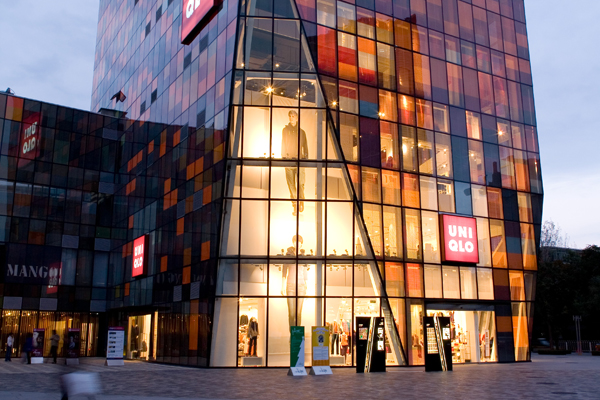This success has surprised some, and not only because of ill-feeling towards Japan from many Chinese because of the latter's wartime record.
一些人對(duì)這一成功感到驚訝,不僅僅是很多中國(guó)人反感日本。
China is not an easy place to work, and, in clothing at least, Chinese consumers tend to revere brands.
中國(guó)并不是一個(gè)容易的工作地點(diǎn),至少在服裝上,中國(guó)消費(fèi)者有品牌崇拜傾向。
But even the label-obsessed need plain bits and bobs for layering or co-ordination.
但為了分層或協(xié)作,標(biāo)簽迷戀也需要普通的零碎。
Chinese consumers are after quality, and UNIQLO's special fabrics, especially its Heattech range for cold weather, function well.
中國(guó)消費(fèi)者追求質(zhì)量,優(yōu)衣庫(kù)的特種面料,尤其是其冬季Heattech保暖衣效果不錯(cuò)。
Above all analysts point to the company's savvy Japan-educated Chinese executives who understand both the culture of the Japanese business and that of China.
分析師首先點(diǎn)名該公司的中國(guó)高管們,他們很懂行并在日本接受教育,能夠理解日本和中國(guó)的商業(yè)文化。
But the rest of Asia may be harder to crack.
但是其他亞洲國(guó)家可能更難搞定。
For one thing, a warm climate in several countries means that UNIQLO cannot rely on its cold-weather products as a main driver of sales.
一方面,幾個(gè)國(guó)家溫暖的氣候意味著優(yōu)衣庫(kù)無法依靠其冬季產(chǎn)品作為一個(gè)銷售主打。

It may have to tweak its formula, which could be risky, says Takahiro Saito, a fashion-retail analyst and author of a book comparing UNIQLO and Zara.
可能還需要調(diào)整它的方案,這樣很冒險(xiǎn),時(shí)尚零售分析師、優(yōu)衣庫(kù)和Zara比較書籍作者Takahiro Saito說到。
Though they are very different markets, Europe and America offer a cautionary tale.
雖然它們是非常不同的市場(chǎng),歐洲和美國(guó)提供了一個(gè)警世故事。
UNIQLO in America struggled outside the big cities of the east and west coasts.
美國(guó)優(yōu)衣庫(kù)想要開拓東西海岸的大城市。
Growth in the heartlands remains elusive for UNIQLO both there and in Europe.
該地和歐洲的優(yōu)衣庫(kù)難以實(shí)現(xiàn)中心地帶的增長(zhǎng)。
In part that is because the same business model exists there already with firms such as Gap, says Mr Saito.
部分原因是因?yàn)槟抢镆呀?jīng)有同樣的商業(yè)模式存在了,比如Gap,Saito說到。
But UNIQLO could do better at explaining what it does.
但優(yōu)衣庫(kù)可以在解釋這種模式的作用方面做得更好。
Well thought-out partnerships with ambassadors, such as tennis player Roger Federer,
和大使比如網(wǎng)球運(yùn)動(dòng)員羅杰·費(fèi)德勒,深思熟慮的合作關(guān)系
and collaborations with designers, like Jil Sander, are starting to help.
以及和設(shè)計(jì)師,如吉爾·桑達(dá)的合作開始有所幫助了。
Mr Yanai, an ardent fan of globalisation unlike many Japanese executives
和很多日本高管不同,柳井正是全球化熱忱的粉絲
(the firm's working language is English and many employees, even in Japan, are foreign),
(公司的工作語(yǔ)言是英語(yǔ),很多甚至是在日本的雇員都是外國(guó)人),
is confident that he can guide UNIQLO through the changes needed.
他有信心自己可以引導(dǎo)優(yōu)衣庫(kù)通過所需的改良。
He also talks of expanding into shoes as well as dresses and skirts, where UNIQLO currently has only slim offerings.
他還談到了進(jìn)軍鞋子以及裙子界,優(yōu)衣庫(kù)目前僅提供slim款。
The backlash against globalisation is the biggest risk to UNIQLO's Asian plans, he says.
他表示,反對(duì)全球化是優(yōu)衣庫(kù)亞洲計(jì)劃的最大風(fēng)險(xiǎn)。
It could limit free movement of goods and people, disrupting both supply chains and workers.
這樣會(huì)限制商品和顧客的自由移動(dòng),擾亂供應(yīng)鏈和工人。
Still, a Japanese firm that has managed as much foreign success as UNIQLO should be able to cope.
但一家像優(yōu)衣庫(kù)這樣在海外市場(chǎng)取得成功的日本公司應(yīng)該能夠應(yīng)對(duì)。
譯文由可可原創(chuàng),僅供學(xué)習(xí)交流使用,未經(jīng)許可請(qǐng)勿轉(zhuǎn)載。












